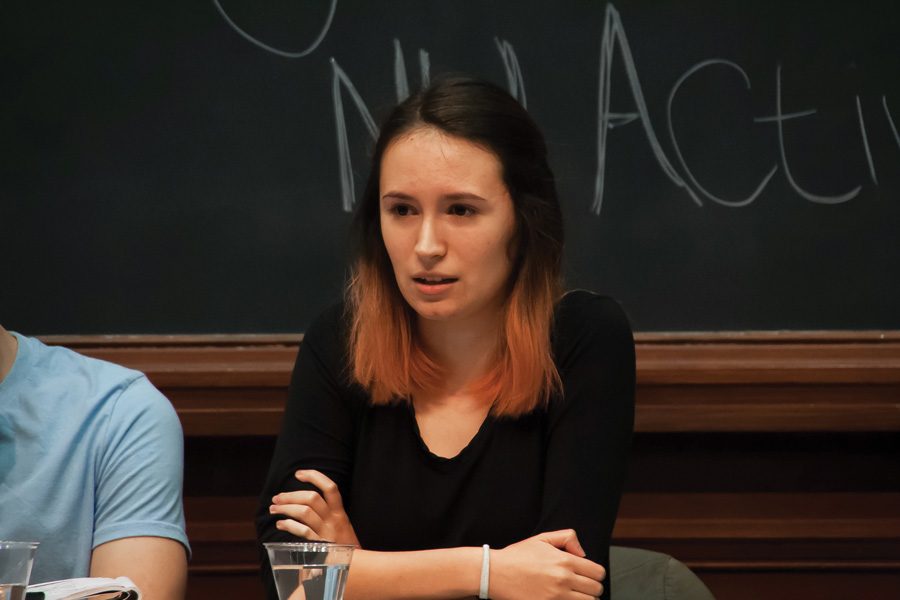Students discuss mental illness, campus resources at stigma panel
Katie Pach/Daily Senior Staffer
A student speaks at the annual NU Active Minds panel on mental illness stigma. Students shared their personal stories and challenges about dealing with mental illness on campus.
November 4, 2016
With the intention of working to destigmatize mental illness on campus, a panel of students discussed their personal experiences with mental health at an event hosted by NU Active Minds on Thursday night.
The panel comprised four Northwestern students who shared their personal stories, after which they answered questions from the audience. Roughly 40 people attended the event held in Harris Hall.
“Silences are the product of stigma, and these things have a really real and visceral effect on people,” panelist Rachel Hawley said during the event. “It’s good to have community role models of people who are talking about it, not in an active way that sensationalizes but (with) role models who are dealing with ongoing issues and are doing really well.”
The Weinberg sophomore also emphasized that sharing personal stories regarding mental illness isn’t for everyone and that everyone’s journey is different.
“The model of surviving and thriving with a mental illness should be one of variation and not of standardization,” Hawley said.
Although audience members and speakers appreciated a space to discuss the topic, Weinberg sophomore Karolina Leziak told The Daily she believes NU’s campus culture can make it difficult to speak out about mental health.
“The most accurate analogy I heard was (during) freshman year of the duck in a pond,” said Leziak, who attended the event. “Everyone at the surface seems okay, but underneath everyone is scrambling to get by. There definitely exists a toxic environment at Northwestern where you have to pretend that you’re okay. … For a lot of people that just doesn’t work.”
Both Leziak and SESP sophomore Elizabeth Phillips, who also attended the panel, expressed admiration for the University’s decision to end Counseling and Psychological Services’ 12-session limit.
Still, it sometimes feels as though campus resources are too finite, Phillips told The Daily.
“(CAPS) refers you outward, usually just because they don’t have staff to do it,” Phillips said. “Even when you do go to have that conversation with someone, it can never really be long-term, and you get taken somewhere different that isn’t through the University. But mental illness isn’t something that usually happens just once.”
Panelist Josh Coffey said he has found that Greek life can provide students with a support system.
“Greek life gives you a place to call home, and it has the potential to foster healthy relationships and a really healthy sense of self,” the McCormick senior told The Daily. “And while I don’t think it’s systematically wrong, there can be a preference of social acceptance over (prioritizing) your own emotions.”
Coffey said taking a quarter off helped him truly develop a sense of self. Likewise, Hawley said the quarter system lets students take time off to seek treatment without falling too far behind.
Though the panel discussed serious topics such as anorexia, social anxiety and clinical depression, Coffey remained optimistic about the perception of mental illness and mental health on campus.
“If people took the time to really look into it more, things would get a lot better,” Coffey said.
Email: [email protected]
Twitter: @jakeholland97


